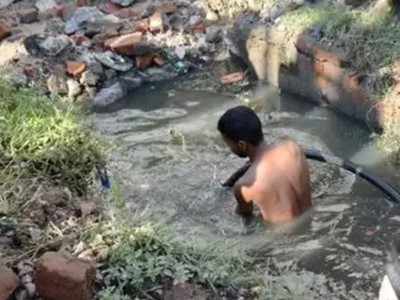The Indian Express 06.08.2012
Hands tied, BMC renewed contract of company that wanted to opt out
Since June, the streets of the country’s financial capital have
raised a stink like never before, owing to garbage collection operations
being severely hit. Even as residents and office-goers in Dadar, Parel,
Worli, Bhandup Mulund and Ghatkopar have been promised respite with new
contracts kicking in, it is increasingly clear that civic
administration had been forewarned of an impending near-collapse of the
garbage collection system in the city.
Of the various private contactors who handle the garbage
collection in the city, the JV Partners, Antony Waste Handling Cell and
Antony Garage Ltd handle 10 of the total 24 wards of the city. Of the
total fleet of 677 large compactors, mini compactors and small closed
vehicles used for garbage collection by all private contractors, a
whopping 42 per cent belong to Antony Waste Handling Cell.
The firm, which handles over 50 per cent of the total waste
collection in the city, had informed the BMC in March this year of their
inability to renew the contracts after its term ends in May. However,
the civic administration, which was forced to renew the old contracts
for six months as the new contracts were not yet in place, renewed
Antony Waste Handling Cell’s contract as well.
Rahul Shewale, BMC standing committee chairman and Shiv Sena
corporator, said, “It was a gross mistake on the part of the civic
administration as they failed to have a contingency plan despite the
contractor warning them of his inability to continue the next contract.”
Additional Municipal Commissioner Mohan Adtani said, “The company
has a financial problem and owes the BMC heavy penalty amount. It was
the lack of professionalism on the part of the company in carrying out
the garbage collection work which affected the residents in many areas”.
“The fact that the BMC is not able to procure the optimum number
of compactors coupled with the fact that it was this one company, Antony
Waste Handling Cell, which had the majority of the wards under them led
to poor garbage collection in certain areas,” said Adtani.
Siju Antony, director, Antony Waste Handling Cell said, “I was
not interested in continuing with the garbage collection contracts after
the old contract term ended in May as we are already handling the
Kanjurmarg dumping project and it would not be fair to handle both
projects. Also, the company is under financial stress and it would help
ease the burden.”
Changing Grounds
The city generates around 6,500 metric tonnes of Municipal Solid
Waste (MSW) and an additional 2,000-2,500 metric tonnes of construction
waste (debris and silt).
At present, the Kanjurmarg dumping ground, which has been
partially opened, receives 500 metric tonnes of garbage. Mulund receives
1,000-1,500 metric tonnes of garbage and Deonar (left) receives the
remaining chunk of 5,500 metric tonnes of MSW, said officials at the BMC
Solid Waste Management Department.
SWM chief engineer Shekhar Chitale said the Kanjurmarg scientific
dumping ground would be ready by the year-end. Along with this will
begin the partial closure of the 128-hectare-large Deonar dumping ground
(slated since 2009) and the 26-hectare-large Mulund dumping ground
(slated since 2010).
FROM DOORSTEP TO LANDFILL
Every housing society appoints a garbage collector to carry out
its door-to-door collection. This collected waste is then handed over to
the municipal corporation’s garbage collection vehicles
The vehicles begin their journey every day at 7am when they
report to Motor Loader (ML) Chowks present in each ward. At the chowk,
every vehicle’s attendance is recorded
There are 3,800 collection points in the city. The residential
society’s appointed door-to-door collector hands over the society’s
garbage to the collection vehicles after which the transport reaches the
ward’s check post
Garbage collected from slum areas through community based
organisations under the slum adoption scheme is deposited into the
nearby community waste bins which are emptied into the collection
vehicles as well. At present, jointly the BMC has installed 5,800
community bins and dustbins across the city. One tempo travels the ward
for collection of dry waste which is then sold off to agencies
associated with the BMC
Smaller collection vans are dispatched to the four transfer
stations located at Mahalakshmi (with a capacity for transferring 750
metric tonnes of waste), Kurla (700 metric tonnes), Versova (350 metric
tonnes), and Gorai (250 metric tonnes) where the garbage is loaded onto
bigger vehicles
Bigger collection vehicles such as compactors, and hook leaf
containers, are sent directly to the three dump yards at Deonar,
Kanjurmarg, and Mulund. On reaching the grounds, authorities at the site
weigh the vehicles and log in the vehicle’s attendance. The vehicles
wait in a queue and are let into the grounds in a single file to offload
the waste at the designated spot.
 Residents cry foul
Residents cry foul
“Garbage collection has been a problem even before June. Vehicles
were irregular right from March or earlier, the vehicles would come
every alternate day or so,” said Vijaya Dange, a resident of Bhandup who
has been complaining to ward officials incessantly to no avail. Selma
Lobo, a resident of Nahur, the problem was especially bad during the
de-silting of the nallahs carried out by the BMC Stormwater Drains
Department. “They would clean up the gutters and leave the waste on the
side of the road. Even before June the garbage vans have been coming
only twice or thrice in a week,” said Lobo.

